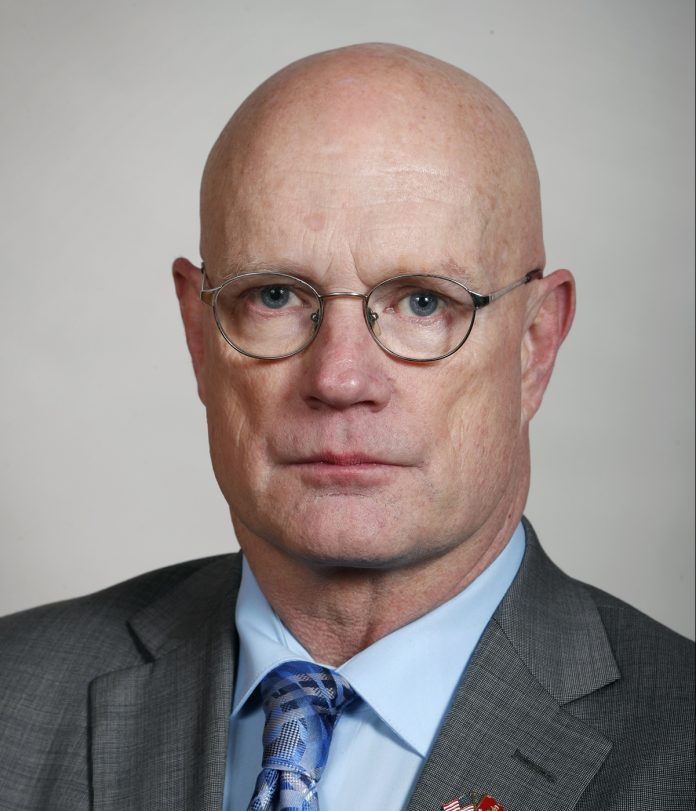Republicans in the Iowa House finally got judicial nominating reform done. But it was much different than the original plan.
In order to get it done the Republicans had to amend SF 638, which was the Standing Appropriations bill. The amendment was originally ruled not to be germane.
Rep. Steven Holt (R-Denison) requested to suspend the rules so the amendment could be considered. That effort passed 53-45.
The amendment gives the governor an additional appointment. The governor’s appointments will still need to go through the confirmation process in the Iowa Senate. The state commission will elect its own chair rather than having the senior justice of the Iowa Supreme Court serve in that capacity.
Currently the chief justice of the Iowa Supreme Court serves an eight-year term. This amendment will change the length of time to two years. It does, however, allow for the chief justices to be re-elected an unlimited number of times. Holt also said the amendment will make it easier for participation from folks in rural communities.
“These changes are well within our constitutional authority,” Holt said. “Giving the governor one additional selection will make our judicial nominating process more accountable to the people.”
Iowa lawyers will still have an unusually high amount of influence on the commission, but that influence will be slightly less now. Holt said it gives more of a voice to the people and a little bit less voice to a small group of attorneys.
“This extra appointment does not politicize the system in any way,” he said. “It cuts both ways politically. It gives an extra voice to a Republican governor just as it would a Democrat governor.”
Rep. Mary Wolfe (D-Clinton) called the amendment an opportunistic power grab that doesn’t belong in a budget bill.
“It doesn’t reflect well on this body or the people of Iowa and ultimately is not a good amendment for Iowa,” she said. “When the people in power take advantage of that power to change the rules or change the laws to give themselves even more power, that ladies and gentlemen is a power grab.”
Wolfe said it looks really bad to give the governor control of the commission.
“It destroys the current balance of power to the extent that there is a balance of power,” she said. “It destroys it in favor of the majority (party).”
She said the amendment does the same thing as the bill to change the judicial nominating process that has failed to generate the necessary votes to pass the House.
Rep. Karin Derry (D-Johnston) said Iowa’s current system does not need fixed.
“It certainly does not need to be politicized,” she said. “During my campaign I spoke with thousands of voters. Not one voter told me that they were unhappy with how we select Iowa’s appellate judges. Yet here we are on a Saturday at the very end of the session changing the way Iowa’s appellate judges are nominated without the benefit of public input. Nobody asked for this.”
Rep. Rick Olson (D-Des Moines) spoke against the amendment.
“I’ve always assumed that the litmus paper test as to why legislators change, amend or otherwise enact a statute is because there is a legitimate need or legitimate reason for a new law,” Olson said. “I suggest that there is not a need, there is not a reason.”
Olson said Holt had asked for input on the bill that would’ve changed the judicial nominating process earlier in the session, but did not reach out for input on the amendment. If the process needed change, Olson said Republicans are going about it in the wrong way.
“Amend the Iowa Constitution,” he said. “Let the legislature vote and the People speak. A chance to the way an equal branch of government in part is selected demands transparency, demands public input. We should listen to the People of Iowa. Is the right to have a fair and impartial judiciary any less important than the right to bear arms?”
Former Republican Rep. Andy McKean (D-Anamosa) spoke against the amendment. He said he was disappointed an impressive Standings bill changed with the amendment.
“I think it’s a sad day for the state of Iowa,” he said. “To call what we have before us any sort of a compromise is laughable. It is what it obviously is — the latest of many desperate attempts to corral 51 votes for a piece of very questionable legislation. It was a bad idea when it was first proposed, it was a bad idea in the many configurations of it that have been thrown together to convince concerned Republicans to get on board and it is no better this morning. It is bad because it politicizes our courts.”
While the idea might seem like a good one to Republicans today, McKean said, it might not seem so grand in the future when a Democrat is governor.
“Is that the kind of court we want? One that changes with the political winds,” McKean said. “I certainly hope not.”
McKean said the amendment is purely partisan.
“Let’s acknowledge the bill for what it is,” McKean said. “A blatantly partisan effort to remake the court in the majority party’s image.”
He also defended current chief justice, Mark Cady.
“Honorable and decent man who is being treated very, very shabbily in this legislation,” McKean said.
Holt said the changes in the amendment do not alter the merit-selection process. He also said the language passed in 1973 contained an escape clause because legislators back then had concern about giving too much authority to a small group of attorneys.
He added there is no need to amend the constitution since the legislature is given the authority to make the changes from the constitution.
Holt addressed McKean’s comments as well, saying he would not lend dignity to McKean’s insulting comments about back rooms.
“We listened for six months,” Holt said. “Everything really that was objected to in the initial legislation isn’t in it any more.”
As for changing the chief justice’s term to two years, he said nine other states have a term of two years or less.
“Let’s think for a minute if we were in this assembly and we didn’t get to vote for our leadership but not for every eight years,” Holt said. “Every two years the make up changes. By the time you get to the eight-year point, leadership may well not reflect our priorities any more. That is exactly the same thing as happens on the Iowa Supreme Court.”











